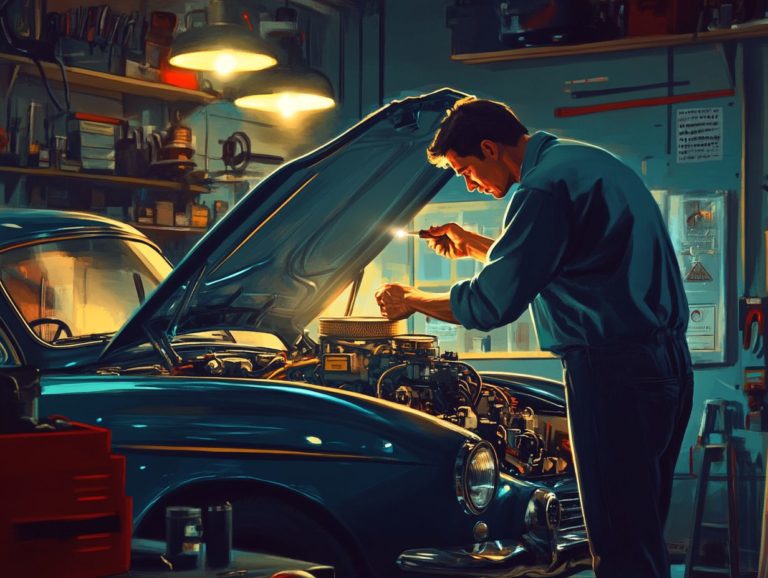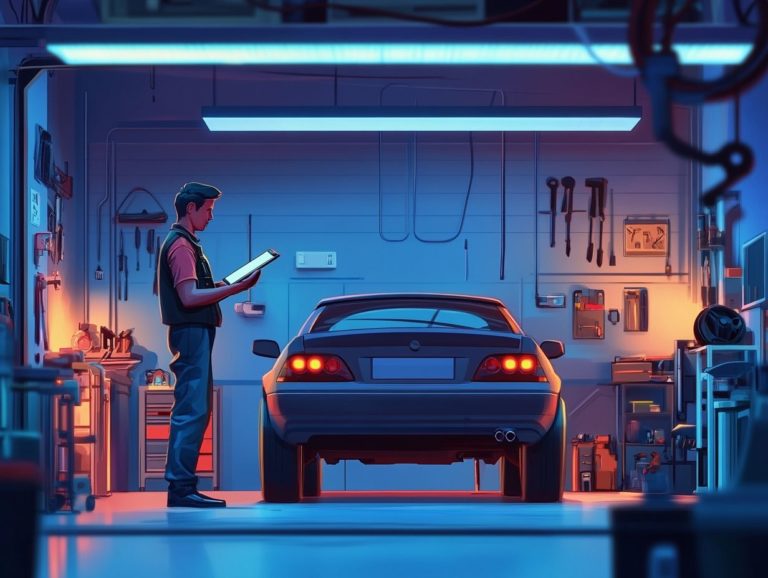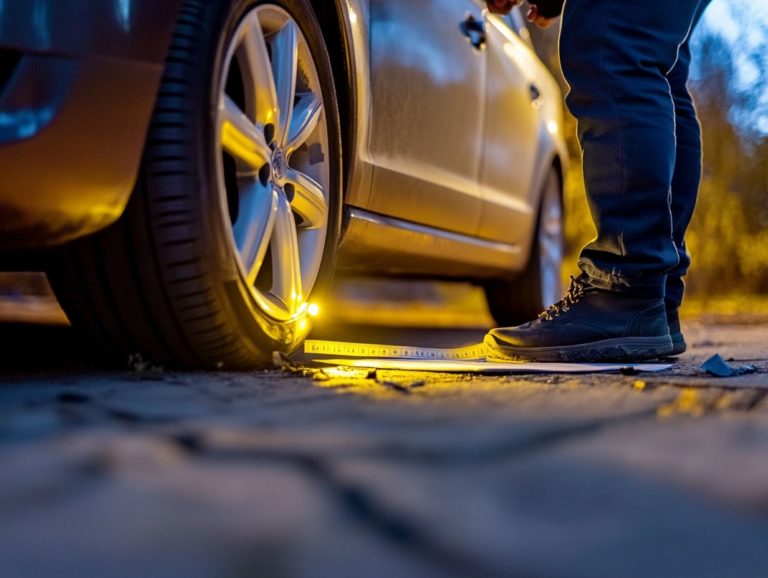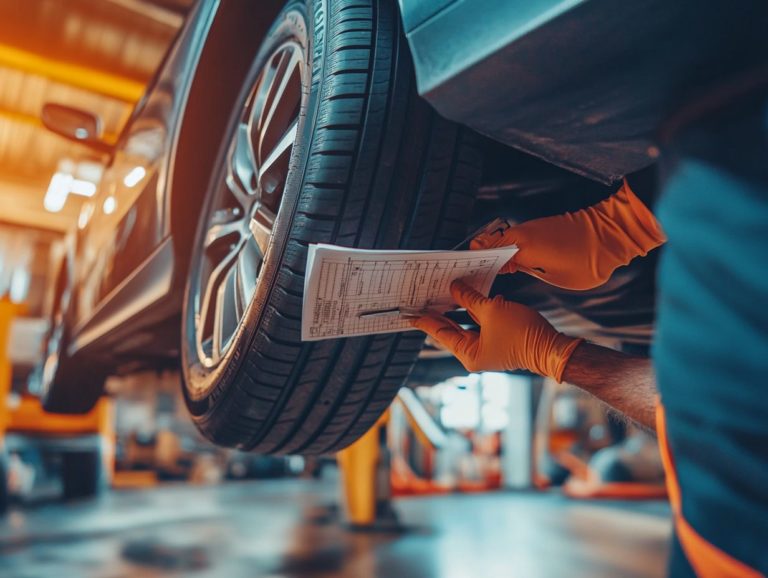Top 7 Mistakes to Avoid During a Car Inspection
When you re in the market for a used car, thoroughness is essential to ensuring a smart investment.
Many buyers often forget this important step, unwittingly overlooking vital actions that could save them from future headaches. Whether it’s skimming over the crucial vehicle history report or forgoing a detailed inspection of the tires and brakes, these common mistakes can result in expensive surprises later on.
This article outlines the top seven mistakes to avoid during a car inspection. It empowers you with the knowledge needed to make informed decisions and secure a dependable vehicle.
Contents
- Key Takeaways:
- 1. Not Checking the Vehicle History Report
- 2. Skipping a Test Drive
- 3. Not Inspecting the Exterior and Interior
- 4. Neglecting to Check for Leaks or Rust
- 5. Not Checking the Tires and Brakes
- 6. Overlooking the Undercarriage and Suspension
- 7. Not Verifying the Vehicle Identification Number (VIN)
- What Is a Car Inspection and Why Is It Important?
- Frequently Asked Questions
- What are the top 7 mistakes to avoid during a car inspection?
- Why is it important to schedule regular inspections for my car?
- What should I check for when inspecting my car’s tires?
- Is it okay to ignore warning lights during a car inspection?
- Why is it important to check the fluid levels during a car inspection?
- What are some common issues with brakes that are often overlooked during car inspections?
- Can minor issues be ignored during a car inspection?
Key Takeaways:
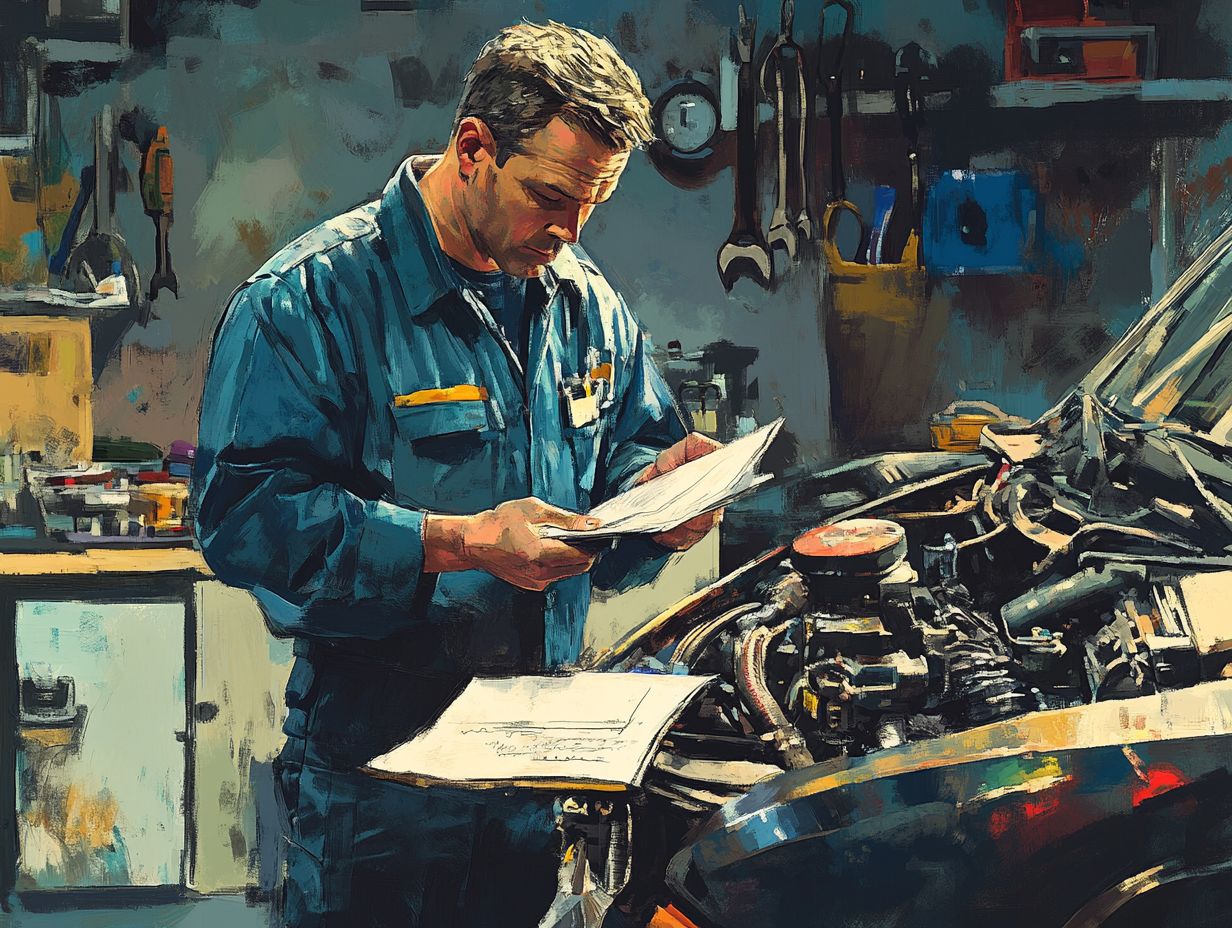
- Always check the vehicle history report to avoid issues.
- Always take a test drive; it s crucial for assessing the car’s condition.
- Inspect the car’s exterior and interior for damage and wear.
1. Not Checking the Vehicle History Report
Failing to check the vehicle history report can have significant consequences when purchasing a car. This report gives you important details about the car’s past, often containing crucial information about previous accidents, maintenance history, and potential mechanical issues that could impact the reliability of a pre-owned vehicle.
If you’re in the market for a used car, it’s essential to grasp the importance of obtaining a detailed vehicle history report from reputable sources like CARFAX or AutoCheck. Many buyers often forget this important step, unwittingly placing themselves at risk of encountering unforeseen problems later on think high repair costs or the emotional burden of buyer’s remorse.
Ignoring warning signs in these reports could lead you to buy a car with a past of serious accidents or incomplete maintenance records, which can compromise both safety and performance. By valuing this information, you can make informed decisions that protect your investment, ensuring a much smoother ownership experience.
2. Skipping a Test Drive
Skipping a test drive is one of the most critical mistakes you can make when considering a used car purchase. It directly impacts your ability to assess the vehicle s performance and driving safety.
Taking the time to get behind the wheel allows you to gauge the vehicle’s acceleration, braking, and overall responsiveness, giving you a tangible sense of comfort and convenience. Comfort and handling are essential aspects that significantly enhance your driving experience; those subtle nuances, like seat support or steering feedback, can only be appreciated through actual driving.
Don t forget to check the vehicle s safety ratings they can vary greatly! Overlooking a thorough test drive can lead to common pitfalls, resulting in a poor match for your lifestyle or driving needs, often leading to regret shortly after the purchase.
3. Not Inspecting the Exterior and Interior
Neglecting to conduct a thorough inspection of both the exterior and interior of a vehicle can lead to unexpected mechanical issues and expensive repairs, making it one of the most common mistakes when purchasing a used car.
A comprehensive evaluation of the vehicle s condition is essential. This means examining the paint for any signs of rust, scratches, or mismatched colors that could hint at previous accidents. You should also carefully assess the upholstery for any tears, stains, or fading, and check the condition of electronic features like lights, windows, and infotainment systems to ensure everything operates smoothly.
By employing basic automotive maintenance tips, you can enable yourself to spot red flags, such as unusual sounds during a test drive or warning lights on the dashboard. This knowledge will help you make informed decisions about your purchase, ensuring you drive away with a vehicle that truly meets your needs.
Avoid these mistakes and drive away with confidence!
4. Neglecting to Check for Leaks or Rust
Neglecting to check for leaks or rust can lead to serious and costly issues down the line. This makes it an essential step in your vehicle inspection process. It s a common mistake many used car buyers make.
To effectively uncover these hidden problems, focus on inspecting several key areas of the vehicle. Start by examining the undercarriage, paying close attention to spots where moisture tends to accumulate, such as:
- Fuel tank
- Brake lines
- Exhaust system
When you open the hood, take a closer look at the engine block and hoses. These can develop leaks over time too. Don t overlook the wheel wells and areas around the doors; they can harbor rust that, if ignored, will only get worse.
Ignoring these signs can affect your vehicle’s performance and lead to premature breakdowns. This increases maintenance costs and jeopardizes your safety.
Regular inspections aligned with your vehicle s maintenance schedule are crucial to prevent issues and extend its lifespan. Make it a habit to inspect these areas regularly!
5. Not Checking the Tires and Brakes
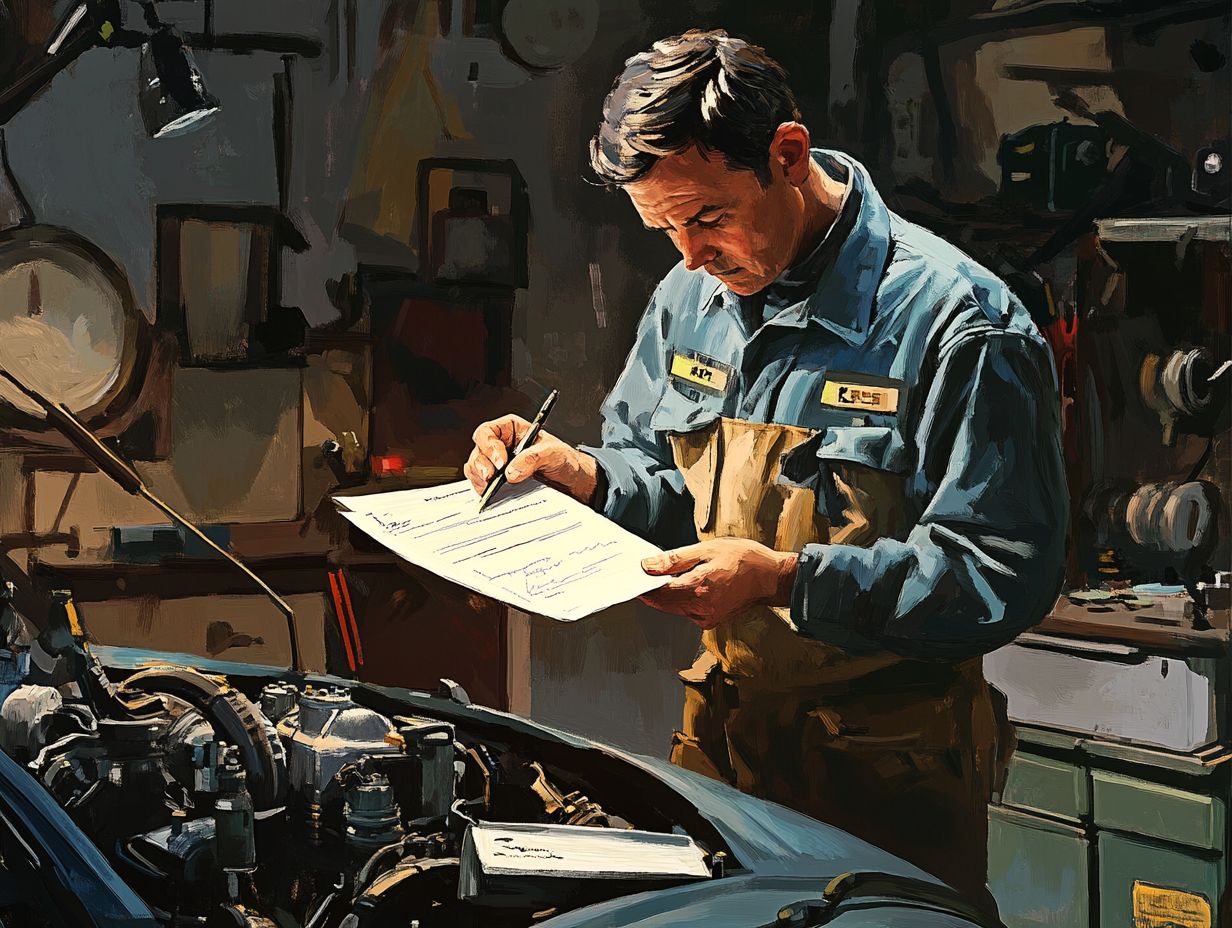
Don’t let overlooked tire maintenance and brake checks put your safety at risk! Overlooking these components is a critical mistake that can hurt your driving safety and vehicle performance.
Proper tire pressure is key; it ensures optimal contact with the road, enhancing both handling and fuel efficiency. On the flip side, inadequate tread depth can lead to reduced traction, especially in wet conditions.
Monitoring brake fluid levels is also vital. Insufficient fluid can result in brake failure, posing a serious risk to everyone on the road. Many drivers underestimate the significance of small discrepancies in these areas, but neglecting routine inspections can lead to serious accidents and costly repairs.
By addressing these common oversights before finalizing your purchase, you can take proactive steps toward ensuring that your vehicle remains safe and reliable on the road.
6. Overlooking the Undercarriage and Suspension
Overlooking the undercarriage and suspension can lead you to miss critical mechanical issues that significantly impact your vehicle’s longevity and safety. It’s one of the more common missteps when purchasing a used car.
The undercarriage is home to vital components, including the fuel tank, exhaust system, and suspension parts. If these are compromised, you could face costly repairs and diminished performance.
Conducting a thorough inspection for signs of rust or structural damage will help you avoid future complications. This ensures that your vehicle operates at its best.
A failing suspension system doesn t just detract from ride quality; it can also impair handling and braking. This poses a serious safety risk on the road, making regular maintenance and checks absolutely essential for sustainable vehicle ownership.
7. Not Verifying the Vehicle Identification Number (VIN)
Failing to verify the Vehicle Identification Number (VIN) can lead you into a world of complications, such as purchasing a stolen vehicle or one that harbors a hidden history of severe accidents. This represents a significant mistake many buyers make when acquiring a car.
This crucial step involves meticulously checking the VIN on the vehicle against the one documented in its paperwork to ensure a perfect match. When discrepancies pop up, it raises immediate red flags about the car’s credibility and ownership.
Connecting the VIN to a comprehensive vehicle history report not only reveals previous owners but also uncovers any reported damages or suspicious claims. You should never underestimate the importance of this verification process; it significantly minimizes the risk of unexpected issues and bolsters your confidence in making a sound investment.
You must verify the VIN before you buy a car to avoid serious complications!
What Is a Car Inspection and Why Is It Important?
A car inspection is your key to a detailed check of a vehicle’s overall condition. It aims to identify any mechanical issues and ensure safety while shedding light on maintenance history.
This step is vital in the buying process.
During this examination, various components are scrutinized, including engine performance, brake functionality, tire condition, and the integrity of the vehicle s frame. It’s easy to overlook common pitfalls like minor body repairs or signs of rust, but doing so could lead to significant problems down the road.
Having a keen eye for these details enables you to make informed decisions and can influence your financing options lenders often extend better rates for well-maintained vehicles.
A thorough inspection can greatly enhance a car s trade-in value. Vehicles with documented assessments tend to command higher prices, ensuring you get the best return on your investment without any hassle!
What Are the Different Types of Car Inspections?
Understanding the various types of car inspections is essential to meet your unique needs as a buyer. From pre-purchase inspections for used cars to routine checks at dealerships, each type enhances vehicle safety and performance.
These inspections reassure you about the condition of your prospective purchase and significantly impact your financing options. For example, a thorough pre-purchase inspection can uncover hidden issues that may affect the resale value of the vehicle, ultimately influencing loan amounts and interest rates.
Meanwhile, dealership inspections often come with certifications that instill greater confidence, facilitating smoother financing approvals. Safety inspections are particularly critical; they ensure that every vehicle complies with regulatory standards, providing you with peace of mind and protecting your future investments.
What Are the Common Red Flags to Look for During a Car Inspection?
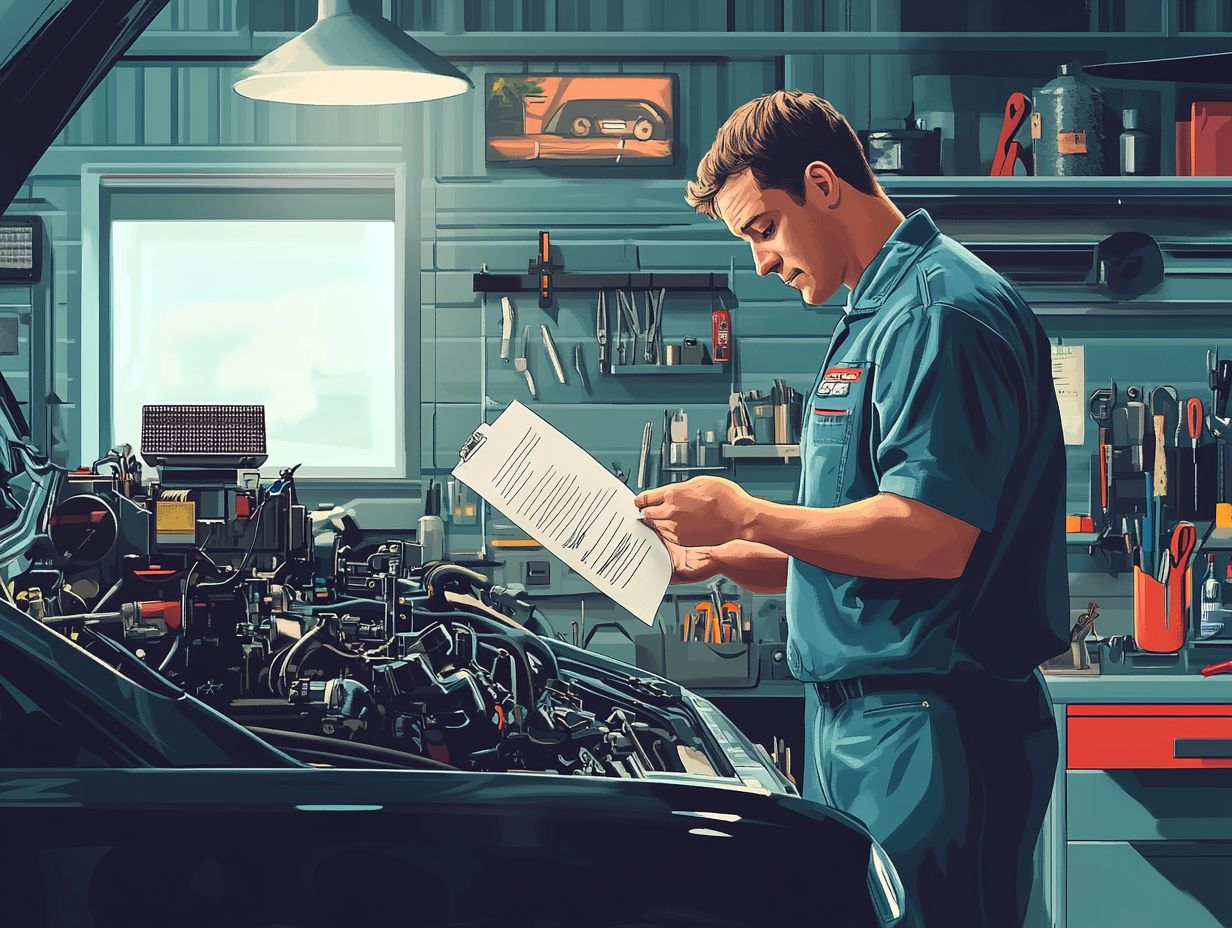
Identifying common red flags during a car inspection like unusual noises, fluid leaks, or uneven tire wear is crucial for avoiding potential mechanical issues and ensuring your vehicle remains reliable.
By paying close attention to these indicators, you can make informed decisions about necessary repairs or maintenance, ultimately prolonging the life of your car. Ignoring these signs could lead to more significant problems down the road, often resulting in costly repairs and potential safety hazards.
Diving deeper into the inspection by checking components like brakes, lights, and belts can uncover hidden issues that might otherwise escape your notice. Staying vigilant during these inspections encourages a proactive approach to automotive maintenance, ensuring that your vehicle stays in optimal condition and consistently delivers dependable performance on the road.
What Are the Benefits of Getting a Professional Car Inspection?
Getting a professional car inspection offers amazing benefits! This includes enhanced vehicle safety, the detection of mechanical issues, and invaluable cost-saving advice that can help you avoid expensive repairs later on.
When you engage skilled inspectors with specialized knowledge, you gain insights that might easily slip through the cracks. These experts employ advanced tools and technologies to conduct a thorough analysis of the vehicle, ensuring that any hidden issues are brought to light before you finalize your purchase.
This proactive approach not only saves you money but also alleviates the stress of unexpected repair costs in the future. Ultimately, opting for a professional vehicle inspection grants you peace of mind and enables you to make informed decisions, paving the way for a more satisfying car ownership experience.
What Are the Costs of a Car Inspection?
Understanding the costs associated with car inspections is crucial for you, the buyer. These fees can vary significantly based on the type of inspection and specific services provided, impacting your overall budget and financing options.
Consider both the initial costs and how these expenses fit into your larger financial picture when purchasing a used vehicle. Initial costs include basic safety checks or comprehensive mechanical checks.
A typical pre-purchase inspection may set you back between $100 and $200. However, a more thorough inspection can escalate to as much as $500, depending on the vehicle’s condition and complexity.
Therefore, it’s wise to seek affordable options, like asking local mechanics for fair quotes. This approach ensures you stay within budget while securing a dependable automobile.
Weigh these costs carefully to avoid surprises, especially when considering potential repair expenses. This will guide you toward more well-considered choices.
How Can a Car Inspection Help with Negotiating the Price of a Vehicle?
A thorough car inspection can enable you to negotiate the price of a vehicle. Documented issues and safety concerns can serve as strong justifications for lower offers and may even enhance your trade-in value.
This detailed report acts as a crucial asset during discussions with the seller. It clearly outlines specific areas of concern that may require repair or adjustment.
By presenting this information, you emphasize the importance of transparency and create a solid foundation for requesting a price reduction. Having a comprehensive inspection report can help you get better financing rates.
Lenders often consider the vehicle’s condition, and a well-documented inspection could lead to more favorable loan terms, ultimately making your purchase more affordable in the long run.
Frequently Asked Questions
What are the top 7 mistakes to avoid during a car inspection?
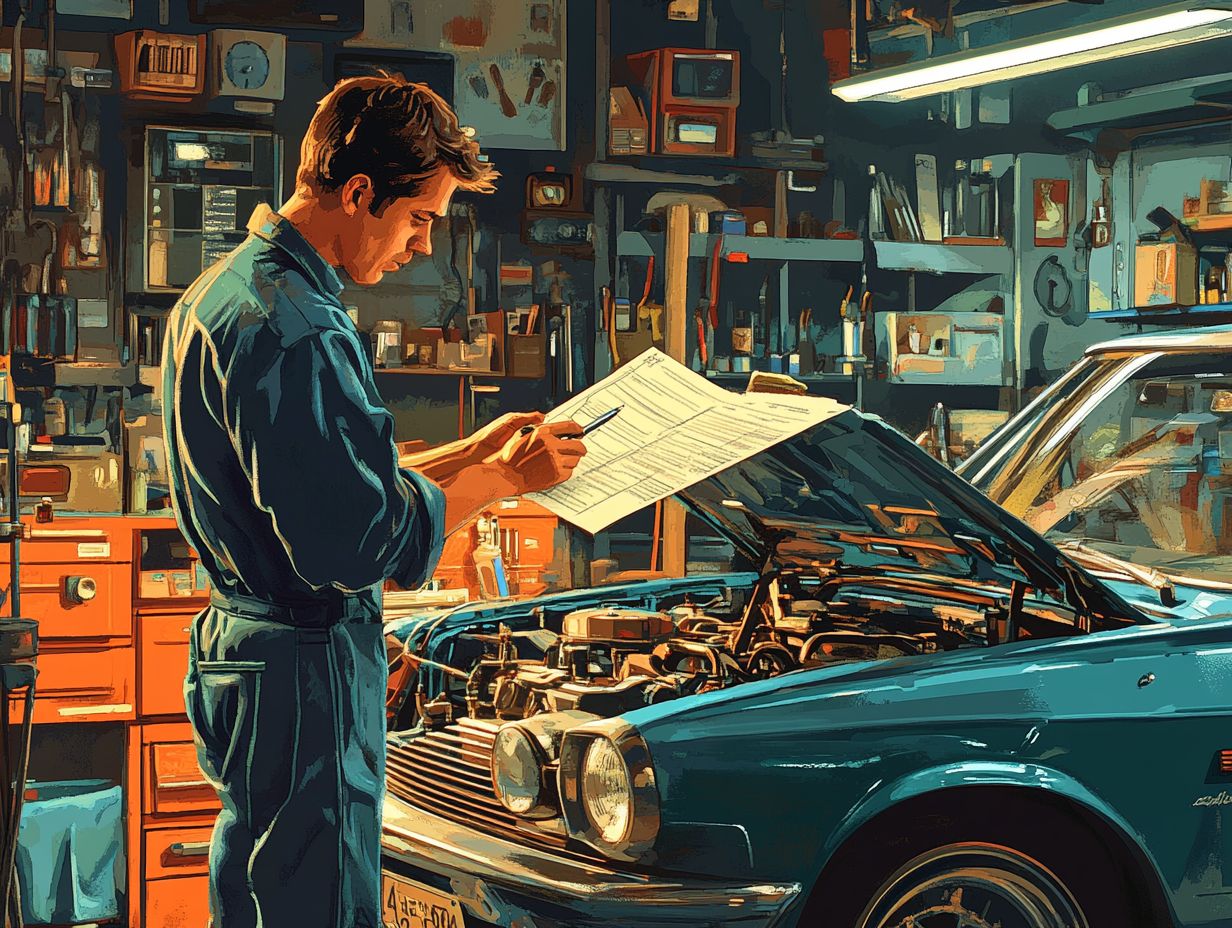
The top 7 mistakes to avoid during a car inspection include:
- Not scheduling regular inspections
- Not checking the tires
- Ignoring warning lights
- Skipping fluid checks
- Neglecting the brakes
- Not inspecting the exterior
- Not addressing minor issues
Why is it important to schedule regular inspections for my car?
Scheduling regular inspections for your car is crucial as it helps identify potential problems early on. This can save you from costly repairs down the line and ensures that your car is safe and reliable to drive.
What should I check for when inspecting my car’s tires?
When inspecting your car’s tires, check the tire pressure, tread depth, and overall condition. Be sure to look for any visible damage, such as cuts or bulges.
Is it okay to ignore warning lights during a car inspection?
No, it is never okay to ignore warning lights during a car inspection. These lights are designed to alert you to potential issues with your car, and ignoring them can lead to further damage and costly repairs.
Why is it important to check the fluid levels during a car inspection?
Checking the fluid levels during a car inspection is crucial as it ensures your car runs smoothly and efficiently. Low or dirty fluids can cause serious damage to your car’s engine and other components.
What are some common issues with brakes that are often overlooked during car inspections?
Common issues with brakes that are often overlooked include worn brake pads, leaking brake fluid, and malfunctioning brake calipers. It is important to address these issues as soon as possible to avoid accidents and further damage to your car.
Can minor issues be ignored during a car inspection?
No, even minor issues should not be ignored during a car inspection. These minor problems can quickly turn into major ones if left unattended, leading to costly repairs and potential safety hazards on the road.

